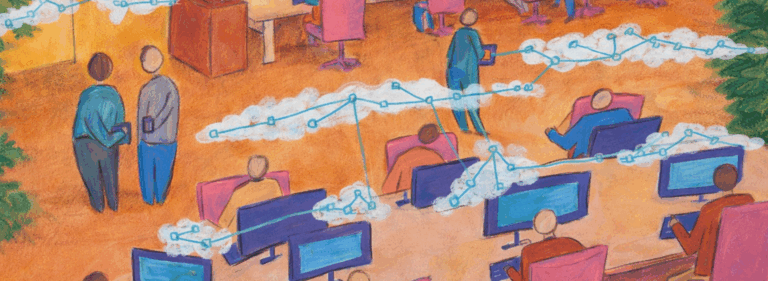An update on GPAI’s Data Governance Working Group – and a call for proposals for two new projects

When we first introduced GPAI’s Data Governance Working Group on this platform, we shared its mandate “to collate evidence, shape research, undertake applied AI projects and provide expertise on data governance, to promote data for AI being collected, used, shared, archived and deleted in ways that are consistent with human rights, inclusion, diversity, innovation, economic growth, and societal benefit, while seeking to address the UN Sustainable Development Goals”.
At GPAI’s inaugural Summit of December 2020, we presented a Framework paper that laid out how the Working Group would approach that mandate, providing an overview of the most relevant terms and defining our understanding of data governance in the context of AI. It was complemented by a detailed investigation into the role of data in AI, which included recommendations on areas of international collaboration that could bear most fruit.
We ended the Summit with a commitment to push forward action-based projects that could have cross-domain impact, and an intention to collaborate with other Working Groups on areas of more vertical interest.
Some months have passed and after a couple of cycles of ideation, development, and prioritisation, we are now very pleased and excited to share an update with you on our work, and extend an invitation to get involved, including two new tenders (links to the Terms of Reference for both with details on how to submit proposals are included at the end of this post).
Our project work will be organised into three categories:
- Cross-domain projects
These represent the primary focus of the Working Group, and we have published calls for proposals on two projects: (1) enabling data sharing for social benefit through data trusts (led within the Working Group by Neil Lawrence and Seongtak Oh) and (2) advancing research and practice on data justice (led by Alison Gillwald and Dewey Murdick).
For data trusts, the Working Group has set its sights on supporting the creation of real-world data trusts that enable data sharing for social benefit. This project will support new institutions that empower individuals and communities to enact their data rights, ensuring that data sharing activities reflect the diverse interests of all in society. The end goal is to help GPAI realise the potential of data trusts as a tool to promote the safe, fair, legal and equitable sharing of data, in service of the UN Sustainable Development Goals.
There are two workstrands on the data institutions project that we are now inviting proposals on: (1) creating consensus and identifying best practice on data trusts and (2) legislative frameworks that support an ecosystem of trustworthy intermediaries. We are inviting proposals for either one or both of these workstrands.
On data justice – which we are defining as fairness in the way people are made visible, represented and treated as a result of their production of digital data, encompassing notions of political rights and justice to social and economic rights – we are seeking to understand the state of the art in this area of research, identify gaps, and extend this research into a practical context with three target audiences: policy makers, individuals and communities marginalised by AI/ML systems, and developer communities.
Again, there are two work strands that we are now inviting proposals for: (1) an annotated bibliography and critical review of the literature to provide needed context and identify gaps that need to be filled as we move towards a more complete view of Data Justice and a forwarding looking research agenda, and (2) the development of ‘preliminary guides’ that will document key questions that our target audiences should be asking based on an assessment of the critical review of the literature and practice.
Both projects will lay the groundwork for GPAI to pilot data trusts and data justice guidance in 2022.
- Cross-Working Group collaboration
A number of our Working Group have volunteered to advise on the data governance aspects of projects being led by other Working Groups, recognising the foundational role of data in AI. We are delighted to be collaborating with the Responsible AI Working Group on climate action and biodiversity and on social media governance; with the Pandemic Response subgroup on Drug Discovery and Open Science, and with the Commercialisation & Innovation Working Group on intellectual property. More than anything else, we are extremely grateful to our Working Group members for volunteering their time to do so.
- An Applied Research Agenda
The Working Group spent the Spring focused on ideation, development and prioritisation of projects we believe are important to advance better data governance in AI, but unfortunately we aren’t able to take all of them forward. We would like to share these wider ideas later in the year, with an invitation to contact our experts if you are interested in exploring them. Depending on feedback, they may well be projects we come back to in future.
We have developed these plans with the fantastic input of our Working Group members, who continue to show amazing commitment. We would like to thank them for all the time and effort they have continued to invest to make this all possible. We have also been delighted to welcome new experts, who have brought welcome new energy to our discussions: Ricardo Baeza-Yates, Asunción Gómez, Robert Kroplewski, Aleksandra Przegalińska, Allan Feitosa, Anderson Soares, Nagla Rizk (observer), and Zümrüt Müftüoğlu (observer).
We are looking for partners to assist the Working Group on our two cross-domain projects and have launched a competitive tender to identify those partners. If you have experience and expertise in these fields, then please read the Terms of References, being published today, and consider submitting a proposal by the deadline of the 18th June 2021:
Project Terms of Reference: “Advancing data justice research and practice”
Project Terms of Reference: “Enabling data sharing for social benefit through data trusts”
If you have further questions, comments, ideas or requests about the Working Group’s future work, then please get in touch via info@ceimia.org.


































